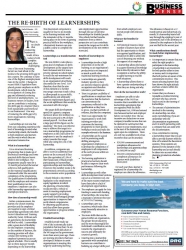Rachel Manzie - DRG Outsourcing: The re-birth of learnerships2016-06-22 There is no doubt that conducting business in South Africa today is both complex and often challenging. One of the most frustrating factors we read about in the media is the growing skills gap in the country. We continue to have one of the highest unemployment rates in the world. Changes in recent BBBEE legislation have placed greater emphasis on skills development, which must be in recognition of closing this gap and ultimately reducing the level of unemployment. As business owners or leaders, how can we contribute to reducing the skills gap in a manner that is both sustainable and beneficial to our businesses? One way of reducing the skills gap is by more organisations running learnerships.
Learnerships are not new, but from our consulting experience the level of knowledge around what a learnership entails, the benefits to both employers and learners and the way in which they are structured remains low. What is a learnership? It is a structured learning programme that is made up of theoretical knowledge and some practical skills that are learnt while in the workplace. The programme usually runs for a 12 month period and the learner achieves a full qualification on the National Qualifications Framework after the successful completion of the programme. The qualification is transferable with the employee and remains their qualification not the employers. Employers can also offer learnership opportunities to unemployed learners. How does a learnership work? Before commencement, the learner, the chosen training provider and the employer are required to sign a formal learnership agreement with their Sector Education and Training Authority (Seta). Without such an agreement, the learnership will not be valid. Learnerships offer a great deal of flexibility for the employer. Depending on the number of learners, the training provider will often conduct the training at the employer's premises as per an agreed schedule. This is usually two to three days per month depending on the learnership. This theoretical component is usually for four to six months at the learning institute with the remainder of the 12 months taking place in the form of gaining practical skills in the workplace. Alternatively learners can join a public course to complete the learnership. Learnerships as a transformation tool The new BBBEE codes place a great deal of emphasis on skills development as the targets have been increased and it is now a priority element in which failure to reach the sub-minimum for skills development will result in an organisation's level being discounted by one level. It is therefore clear that the aim of this element is to further encourage corporate South Africa to allow people to access skills, qualifications and ultimately improve employment figures and the social upliftment that would be associated with this target. The target skills development spend for a generic company (turnover above R50 million) on the new scorecard is 6% of their annual payroll. For those with a large payroll this figure can be daunting! The most cost effective way to achieve this target is to run a learnership programme for employees as the codes allow for employers to use the employee's salary towards this target while also using the cost of the learnership. In addition, companies are able to score an additional four points on the scorecard if they have the equivalent of 2.5% of their headcount of black people participating in learnerships, apprenticeships and internships. However, this number needs to be proportioned correctly according to the economic active population. Closely linked to the BBBEE legislation is the employment equity legislation in which the planning of learnerships would provide a vehicle to assist in meeting employment equity targets by providing previously disadvantaged groups opportunities to improve their work related competencies by obtaining qualifications, and thus allow them greater opportunities to progress within the organisation. Disabled learnerships Disabled people make up 10% of the economically active population but less than 1% are employed, which falls short of the 4% target set by government more than seven years ago. There are training providers that have developed a solution to assist organisations in meeting this target by addressing learning and employment opportunities through the use of full time learnerships for disabled people. This vehicle further benefits employers from a BBBEE perspective as it can contribute towards the targets set for skills development on the new BBBEE scorecard. Benefits of learnerships to employers
Employers are able to take advantage of the SARS tax incentive that is available for all learnerships agreements that are registered with the Skills Development Act, 1998 and entered into between learner and employer before 1st October 2016. The tax incentive are deductions on your company's taxable income that can be claimed for each learner that you have in your employment, once at the start of the learnership, and again upon its completion. There are only two available levels of tax incentives that can be awarded:
What considerations should be made before implementing learnerships?
DRG Outsourcing (Pty) Ltd Tel: +27 (0) 31 - 767 0625 Fax: +27 (0) 31 - 767 3280 david@drg.co.za www.drg.co.za |
Rachel Manzie - DRG Outsourcing: The re-birth of learnerships
Copyright © 2024 KwaZulu-Natal Top Business
